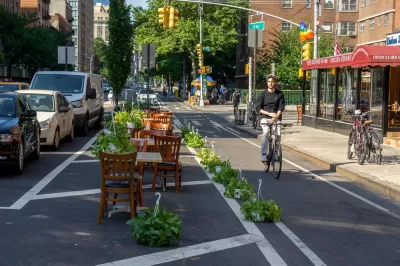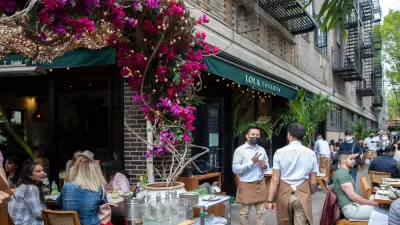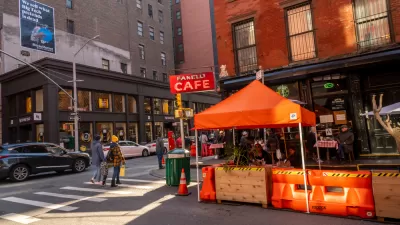As emergency ordinances passed during the pandemic are set to expire, county officials will consider making some pandemic dining accommodations permanent.

After expediting the permitting process for outdoor dining during the pandemic, Arlington County wants to "explore ways to make it easier for restaurants to establish or expand outdoor dining after the pandemic ends," reports Joe DeVoe. According to a county report, "staff will be looking to see if some aspects of the program could be worked into the regular outdoor seating approval process."
The report adds, "staff will be working to commence a strategic exploration of whether certain flexibilities provided as part of the TOSA program initiated in response to the COVID-19 emergency should be incorporated into established regulatory provisions for outdoor dining." The process "will have a robust engagement element and would also include public hearings prior to the County Board’s consideration of any recommended policy or regulatory changes that might result from the study."
"When the county passed a continuity of governance emergency ordinance last spring to keep government and business operations afloat, it said any flexibility allowed by the ordinance, such as TOSAs, would expire six months after the declared end of the emergency. But in reality, the document’s section on TOSAs said they expire with the declared end of the emergency." Now, Kate Bates, President and CEO of the Arlington Chamber of Commerce, urges the county "to get cracking on the study of permanent options" so restaurant owners can confidently invest in outdoor dining infrastructure for the future.
FULL STORY: County to Study Ways of Making Temporary Outdoor Seating Areas Permanent

Alabama: Trump Terminates Settlements for Black Communities Harmed By Raw Sewage
Trump deemed the landmark civil rights agreement “illegal DEI and environmental justice policy.”

Planetizen Federal Action Tracker
A weekly monitor of how Trump’s orders and actions are impacting planners and planning in America.

Why Should We Subsidize Public Transportation?
Many public transit agencies face financial stress due to rising costs, declining fare revenue, and declining subsidies. Transit advocates must provide a strong business case for increasing public transit funding.

Judge Orders Release of Frozen IRA, IIJA Funding
The decision is a victory for environmental groups who charged that freezing funds for critical infrastructure and disaster response programs caused “real and irreparable harm” to communities.

‘Clybourne Park’ Sets Stage for Housing Equity Discussions
Clybourne Park, a play exploring race, real estate, and community tensions, can set the stage for discussion on the lasting impacts of housing discrimination, gentrification, and the fight for affordability.

Understanding Road Diets
An explainer from Momentum highlights the advantages of reducing vehicle lanes in favor of more bike, transit, and pedestrian infrastructure.
Urban Design for Planners 1: Software Tools
This six-course series explores essential urban design concepts using open source software and equips planners with the tools they need to participate fully in the urban design process.
Planning for Universal Design
Learn the tools for implementing Universal Design in planning regulations.
Caltrans
Smith Gee Studio
Institute for Housing and Urban Development Studies (IHS)
City of Grandview
Harvard GSD Executive Education
Toledo-Lucas County Plan Commissions
Salt Lake City
NYU Wagner Graduate School of Public Service





























